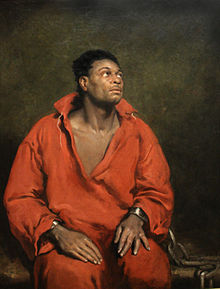Slavery in Britain
historical slavery in Great Britain
Slavery in Great Britain existed and was recognized from before the Roman occupation until the 12th century, when chattel slavery disappeared, at least for a time, after the Norman Conquest. Former slaves merged into the larger body of serfs in Britain and no longer were recognized separately in law or custom.


| This article is a stub. You can help out with Wikiquote by expanding it! |
Quotes
edit- An Englishman is the unfittest person on Earth to argue another Englishman into slavery.
- Edmund Burke, as quoted in Paul Revere's Ride (1995), by David Hackett Fischer, New York: Oxford University Press, p. 30
- As to the doctrine of slavery and the right of Christians to hold Africans in perpetual servitude, and sell and treat them as we do our horses and cattle, that, it is true, has been heretofore countenanced by the Province Laws formerly, but nowhere is it expressly enacted or established. It has been a usage–a usage which took its origin from the practice of some of the European nations, and the regulations of British government.
- For the most trifling reasons, and sometimes for no conceivable reason at all, his majesty has rejected laws of the most salutary tendency. The abolition of domestic slavery is the great object of desire in those colonies where it was unhappily introduced in their infant state. But previous to the infranchisement of the slaves we have, it is necessary to exclude all further importations from Africa. Yet our repeated attempts to effect this by prohibitions, and by imposing duties which might amount to a prohibition, have been hitherto defeated by his majesty's negative: thus preferring the immediate advantages of a few British corsairs to the lasting interests of the American states, and to the rights of human nature deeply wounded by this infamous practice.
- He has waged cruel war against human nature itself, violating its most sacred rights of life and liberty in the persons of a distant people who never offended him, captivating and carrying them into slavery in an other hemisphere, or to incur miserable death in their transportation thither. This piratical warfare, the opprobrium of INFIDEL powers, is the warfare of the CHRISTIAN king of Great Britain. Determined to keep open a market where MEN should be bought and sold, he has prostituted his negative for suppressing every legislative attempt to prohibit or to restrain this execrable commerce. And that this assemblage of horrors might want no fact of distinguished die, he is now exciting those very people to rise in arms among us, and to purchase that liberty of which he has deprived them, by murdering the people on whom he also obtruded them: thus paying off former crimes committed against the LIBERTIES of one people, with crimes which he urges them to commit against the LIVES of an other.
- No! No! Gentlemen, no emotion for me. But, those of congratulation. I am happy. To die is the irreversible decree of him who made us. Then what joy to be able to meet death without dismay. This, thank God, is my case. The happiness of man is my wish, that happiness I deem inconsistent with slavery, and to avert so great an evil from an innocent people, I will gladly meet the British tomorrow, at any odds whatever.
- Johann de Kalb, in August 1780, as quoted in "Death of Baron De Kalb" (1849), by Benjamin Franklin Ells, The Western Miscellany, Volume 1, p. 233.
- Britain, with an army to enforce her tyranny, has declared that she has a right (not only to tax) but "to bind us in all cases whatsoever," and if being bound in that manner, is not slavery, then is there not such a thing as slavery upon earth. Even the expression is impious; for so unlimited a power can belong only to God.
- Thomas Paine, "The Crisis No. I" (23 December 1776), The American Crisis
- The glorious and ever memorable Revolution can be justified on no other principles but what doth plead with greater force for the emancipation of our slaves, in proportion as the oppression exercised over them exceeds the oppression formerly exercised by Great Britain over these states.
- Petition from Frederick County (1784), Virginia
- Britons never will be slaves.
- James Thomson, Alfred: a Masque, II, V.
External links
edit- Encyclopedic article on Slavery in Britain on Wikipedia